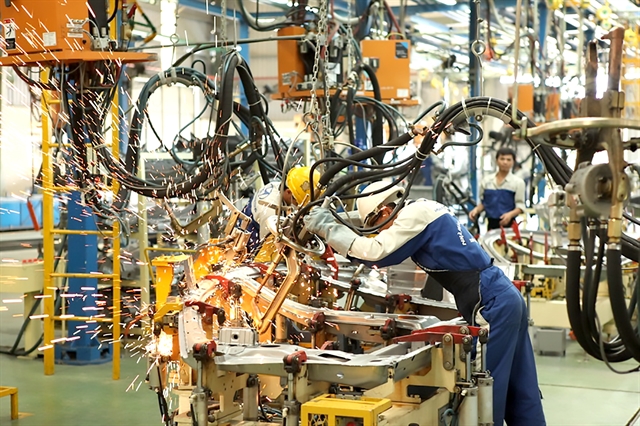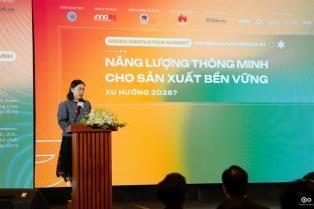Supporting industries are seen as a key foundation for promoting the sustainable development of Việt Nam's economy, reducing reliance on imported raw materials and components.

HÀ NỘI — Although Việt Nam's supporting industries have made progress, the sector still falls short of its full potential. The Government has recently issued Decree 205/2025/NĐ-CP to promote the sector's development.
Supporting industries are viewed as a crucial foundation for promoting the sustainable development of Việt Nam's economy and reducing its reliance on imported raw materials and components.
However, attracting investment into this sector still faces many challenges related to capital, technology and supply chain connectivity.
Decree 205/2022/NĐ-CP, amending and supplementing Decree 111/2015/NĐ-CP, was introduced to address these challenges and create favourable conditions for the development of supporting industries.
Phạm Văn Quân, deputy director of the Industry Agency under the Ministry of Industry and Trade (MoIT), said Việt Nam achieved a record import-export turnover of US$681 billion in the first nine months of this year, with exports reaching $349 billion and imports at $332 billion, resulting in a trade surplus of $17 billion.
However, a concerning fact is that 94 per cent of Việt Nam's imports are raw materials, parts and components.
These are items that the country could produce domestically if it developed a strong foundation for its industries and supporting sectors, Quân told the seminar titled 'Attracting Investment into Supporting Industries: Leverage from Policies' on Monday.
The deputy director stated that the potential for developing supporting industries was vast, but investment capital, particularly from foreign direct investment (FDI) businesses, remained limited.
MoIT statistics show that total investment by FDI businesses in supporting industries has only been around $20 billion from 2020 until now, while investment from domestic enterprises is even lower, ranging from $5-6 billion.
Quân pointed out that the biggest challenges for Vietnamese enterprises lay in two core factors: capital and technology.
Investment in supporting industries requires large capital and modern technology, both of which remain weaknesses for domestic businesses, he said.
Decree 205/2022/NĐ-CP was introduced as an important step forward, featuring breakthrough policies aimed at addressing issues related to capital, research and development (R&D) and market access.
Quân stated that this decree requires FDI enterprises wishing to receive incentives to have partnership agreements with domestic small and medium-sized enterprises, thereby encouraging the participation of Vietnamese businesses in global supply chains.
In addition, centres for industrial development support have been established to allow enterprises to conduct product trials without incurring significant costs.
However, he acknowledged that the implementation of these policies still faces considerable difficulties.
He admitted that policies often suffer from delays and many businesses have not yet fully understood or accessed the incentives due to a lack of professional legal advisory support.
“We have co-operated with localities to organise many awareness-raising sessions, but businesses still do not fully understand the benefits they can receive,” he said.
To overcome this, the MoIT has established the Industrial Development Centre (IDC) in Hà Nội to assist businesses in implementing incentive programmes.
Hoàng Anh Tuấn, deputy director of the Department of Industry and Trade of Bắc Ninh Province, said the province had achieved notable results in developing supporting industries thanks to the strong leadership of local authorities.
The province's industrial production value has grown steadily, ranking among the top in the country, with significant contributions from supporting industry businesses, he said.
It has issued several support policies, signed co-operation agreements with the MoIT and Samsung to improve production for businesses, and implemented mechanisms to facilitate large projects.
Decree 205 is strategic, with specific support from raw materials and production to output, Tuấn said.
Bắc Ninh is committed to implementing this decree effectively through legal support, supply chain connectivity and the building of specialised industrial zones, he noted.
The deputy director also proposed that the MoIT assist with the orientation of technology connection and R&D, and urged localities to register specific supporting industry products so the ministry could develop a comprehensive plan.
Hồ Ngọc Toàn, deputy general director of Automech Mechanical Equipment and Solutions Joint Stock Company, pointed out three advantages of Vietnamese supporting industry enterprises: flexible production transformation, young engineers who quickly adopt technology and a favourable ecosystem with significant market opportunities.
However, businesses still face five weaknesses: small scale, limited capital, failure to meet international standards, outdated technology and lack of design industries.
To overcome these challenges, Toàn recommended that businesses actively innovate, invest in R&D and digitalise to meet market demands. — VNS





